Mark Twain in California

Born Samuel Langhorne Clemens in 1835; Died as Mark Twain in 191
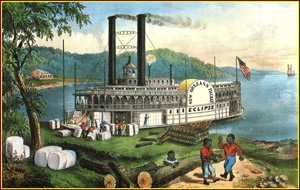 |
| Currier & Ives Loading Cotton On The Mississippi |
In 1863, while reporting on meetings of the Nevada legislature, Clemens first used the pseudonym Mark Twain, derived from a call by Mississippi boatmen sounding the depth of the river.
The next year a trip to the Sandwich (Hawaiian) Islands yielded not only a series of humorous travel letters to the Sacramento Union but also a serious article published in Harper's Magazine.
Upon his return from this voyage, he launched a career on the West Coast as a humorous lecturer that continued until 1906.
In 1866 Twain became a traveling correspondent of the Alta California. A number of letters written for that newspaper told the details of a journey eastward by boat; another series of 17 letters told of his visits to New York and the Middle West in 1867.
A letter of June 23 told of his spending a night in a station house in New York, charged with disorderly conduct.
Others told of visits to art galleries, theaters, museums, and churches in New York and of brief stays with his family. The year 1867 saw the publication of Mark Twain's first book, The Celebrated Jumping Frog of Calaveras County.
In December of 1866, Mark Twain sailed from San Francisco in the Opposition Line's steamer America, Capt. Wakeman, at noon, 15th December, 1866.
December 15, 1866, Daily Alta California, San Francisco
MARK TWAIN'S FAREWELL.
Samuel Clemens, ("Mark Twain,") the talented humorist and brilliant writer, leaves San Francisco on the steamer America, today, and we take occasion to print the farewell address delivered on Monday night, at Congress Hall. After having kept the audience listening in rapt attention to his gorgeous imagery, in describing the scenes at the Sandwich Islands or convulsed with laughter at the humorous sallies interspersed through the lecture, he seemed to come reluctantly to the promised "good-bye," and then his whole manner changed the words were evidently the language of the heart, and the convictions of his judgment. He said:
Puck Magazine: Puckographs, Mark Twain
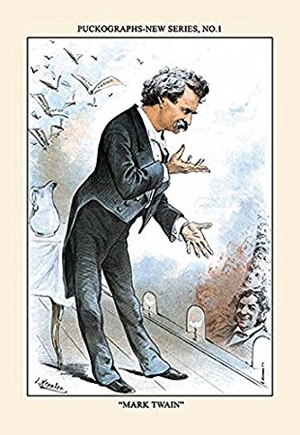
"My Friends and Fellow Citizens: I have been treated with extreme kindness and cordiality by Francisco, and I wish to return my sincerest thanks and acknowledgments. I have also been treated with marked and unusual generosity, forbearance and good-fellowship, by my ancient comrades, my brethren of the Press a thing which has peculiarly touched me, because long experience in the service has taught me that we of the Press are slow to praise but quick to censure each other, as a general thing wherefore, in thanking them I am anxious to convince them, at the same time, that they have not lavished their kind offices upon one who cannot appreciate or is insensible to them.
"I am now about to bid farewell to San Francisco for a season, and to go back to that common home we all tenderly remember in our waking hours and fondly revisit in dreams of the night a home which is familiar to my recollection, but will be an unknown land to my unaccustomed eyes. I shall share the fate of many another longing exile who wander back to his early home to find gray hairs where he expected youth, graves where he looked for firesides, grief where he had pictured everywhere change! remorseless change where he had heedlessly dreamed that desolating Time had stood still! to find his cherished anticipation, a mockery, and to drink the lees of disappointment instead of the headed wine of a hope that is crowned with its fruition!
"And while I linger here upon the threshold of this, my new home, to say to you, my kindest and my truest friends, a warm good-bye and an honest peace and prosperity attend you, I accept the warning that mighty changes will have come over this home also when my returning feet shall walk these streets again. I read the signs of the times, and I, that am no prophet, behold the things that are in store tor you. Over slumbering California is stealing the dawn of a radiant future! The great China Mail Line is established, the Pacific Railroad is creeping across the continent, the commerce of the world is about to be revolutionized. California is Crown Princess of the new dispensation! She stands in the centre of the grand highway of the nations; she stands midway between the Old World and the New, and both shall pay her tribute. From the Far East and from Europe, multitudes of stout hearts and willing bands are preparing to flock hither: to throng her hamlet's and villages; to till her fruitful soil; to unveil the riches of her countless mines; to build up an empire on these distant shores that shall shame the braves, dreams of her visionaries.
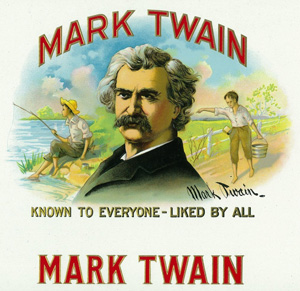 |
| Mark Twain Brand Cigar Box Label Mark Twain was rarely seen sans cigar. |
From the opulent lands of the Orient, from India, from China, Japan, the Amoor; from tributary regions that stretch from the Arctic circle to the equator, is about to pour in upon her the princely commerce of a teeming population of four hundred and fifty million souls. Half the world stands ready to lay its contributions at her feet! Has any other State so brilliant a future? Has any other city a future like San Francisco?
"This straggling town shall be a vast metropolis; this sparsely populated land shall become a crowded hive of busy men: your waste places shall blossom like the rose and your deserted hills and valleys shall yield bread and wine for unnumbered thousands: railroads shall be spread hither and thither and carry the invigorating blood of commerce to regions that are languishing now; mills and workshops, yea, and factories shall spring up everywhere, and mines that have neither name nor place to day shall dazzle the world with their affluence. The time is drawing on apace when the clouds shall pass away from your firmament, and a splendid prosperity shall descend like a glory upon the whole land!
"I am bidding the old city and my old friends a kind, but not a sad farewell, for I know that when I see this home again, the changes that will have been wrought upon it will suggest no sentiment of sadness; its estate will be brighter, happier and prouder a hundred fold than it is today. This is its destiny, and in all sincerity, I can say, so mote it be!"
"Mark Twain" goes off on his journey over the world as the Travelling Correspondent of the Alta California, not stinted as to time, place or direction writing his weekly letters on such subjects and from such places as will best suit him: but we may say that he will first visit the home of his youth St. Louis thence through the principal cities to the Atlantic seaboard again, crossing the ocean to visit the Universal Exposition at Paris, through Italy, the Mediterranean, India, China, Japan, and back to San Francisco by the China Mail Steamship line. That his letters will be read with interest needs no assurance from us his reputation has been made here in California, and his great ability is well known; but he has been known principally as a humorist, while he really has no superior as a descriptive writer a keen observer of men and their surroundings and we feel confident his letters to the Alta, from his new field of observation, will give him a world-wide reputation.
The homeward voyage of this journey began with a tempest a little way out of San Francisco -- a storm terrible but brief, that brought the passengers from their berths to the deck, and for a time set them praying. Then there was Captain Ned Wakeman, a big, burly, fearless sailor, who had visited the edges of all continents and archipelagos; who had been born at sea, and never had a day's schooling in his life, but knew the Bible by heart; who was full of human nature and profanity, and believed he was the only man on the globe who knew the secret of the Bible miracles.
Another event of the voyage was crossing the Nicaragua Isthmus -- the trip across the lake and down the San Juan River -- a brand-new experience, between shores of splendid tropic tangle, gleaming with vivid life. The luxuriance got into Mark Twain's note-book.
Dark grottoes, fairy festoons, tunnels, temples, columns, pillars, towers, pilasters, terraces, pyramids, mounds, domes, walls, in endless confusion of vine-work -- no shape known to architecture unimitated -- and all so webbed together that short distances within are only gained by glimpses. Monkeys here and there; birds warbling; gorgeous plumaged birds on the wing, Paradise itself, the imperial realm of beauty -- nothing to wish for to make it perfect.
But it was beyond the Isthmus that the voyage loomed into proportions somber and terrible. The vessel they took there, the San Francisco, sailed from Greytown on January 1, 1867. The next day two cases of Asiatic cholera were reported in the steerage. There had been a rumor of it in Nicaragua, but no one expected it on the ship.
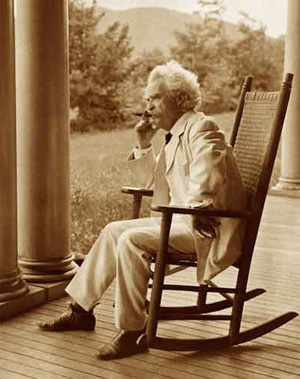 |
| Mark Twain. A. F. Bradley. |
The nature of the disease was not hinted at until evening, when one of the men died. Soon after midnight, the other followed. A minister making the voyage home, Rev. J. G. Fackler, read the burial service. The gaiety of the passengers, who had become well acquainted during the Pacific voyage, was subdued. When the word "cholera" went among them, faces grew grave and frightened. On the morning of January 4th Reverend Fackler's services were again required. The dead man was put overboard within half an hour after he had ceased to breathe.
Gloom settled upon the ship. All steam was made to put into Key West. Then some of the machinery gave way and the ship lay rolling, helplessly becalmed in the fierce heat of the Gulf, while repairs were being made. The work was done at a disadvantage, and the parts did not hold. Time and again they were obliged to lie to, in the deadly tropic heat, listening to the hopeless hammering, wondering who would be the next to be sewed up hastily in a blanket and slipped over the ship's side. On the 5th seven new cases of illness were reported. One of the crew, a man called "Shape," was said to be dying. A few hours later he was dead. By this time the Reverend Fackler himself had been taken.
"So they are burying poor 'Shape' without benefit of clergy," says Twain's note-book.
It was learned that the ship's doctor had run out of medicines. The passengers became demoralized. They believed their vessel was to become a charnel ship. Strict sanitary orders were issued, and a hospital was improvised.
Verily the ship is becoming a floating hospital herself -- not an hour passes but brings its fresh sensation, its new disaster, its melancholy tidings. When I think of poor "Shape" and the preacher, both so well when I saw them yesterday evening, I realize that I myself may be dead tomorrow.
 The Trouble Begins at 8
The Trouble Begins at 8 Since the last two hours all laughter, all levity, has ceased on the ship -- a settled gloom is upon the faces of the passengers.
By noon it was evident that the minister could not survive. He died at two o'clock next morning; the fifth victim in less than five days. The machinery continued to break and the vessel to drag. The ship's doctor confessed to Clemens that he was helpless. There were eight patients in the hospital.
But on January 6th they managed to make Key West, and for some reason were not quarantined. Twenty-one passengers immediately deserted the ship and were heard of no more.
"I am glad they are gone. D--n them," says the notebook. The doctor restocked his medicine-locker, and the next day they put to sea again. On the 8th another of the patients died. Then the cooler weather seemed to check the contagion, and it was not until the night of the 11th, when the New York harbor lights were in view, that the final death occurred.
There were no new cases by this time, and the other patients were convalescent. A certificate was made out that the last man had died of "dropsy."
Mark Twain: Click for a full selection of Mark Twain's Works including:
Autobiography of Mark Twain. The original version
Mark Twain: Cannibalism in the Cars Analyse (German Edition)
The Complete Letters Of Mark Twain
The Complete Mark Twain Collection
(Over 300 works, with active table of contents) (Illustrated)
Grant and Twain: The Story of a Friendship That Changed America, Mark Perry.
How to Tell a Story and Other Essays (1897) (The Oxford Mark Twain)
Mark Twain and Male Friendship: The Twichell, Howells, and Rogers Friendships
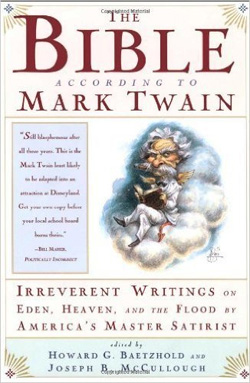 The Bible According to Mark Twain: Irreverent Writings on Eden, Heaven, and the Flood by America's Master Satirist by Mark Twain (1996-12-06)
The Bible According to Mark Twain: Irreverent Writings on Eden, Heaven, and the Flood by America's Master Satirist by Mark Twain (1996-12-06) Copyright ~ 1998-2018.
Copyright ~ 1998-2018. 